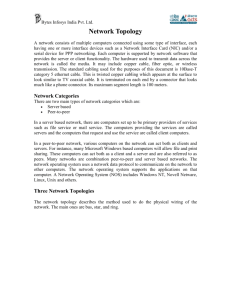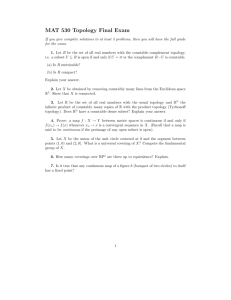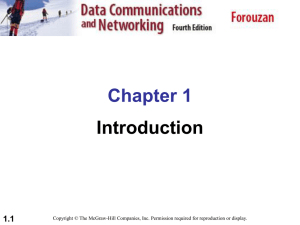TOPOLOGIES RINGS ON OVER
advertisement
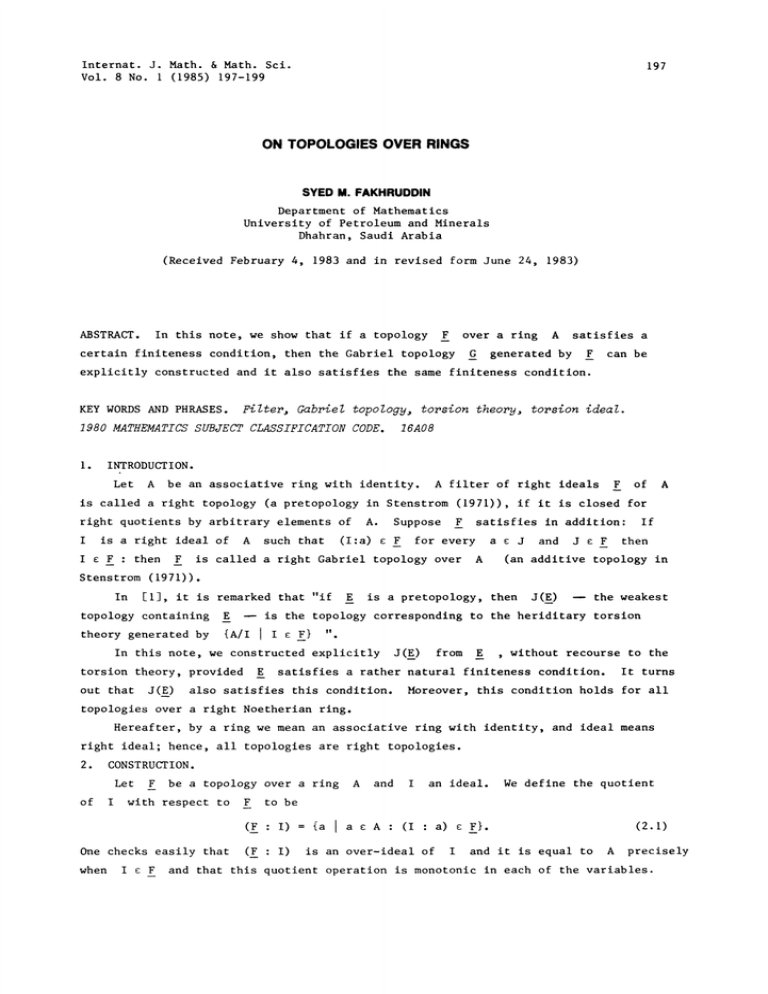
Internat. J. Math. & Math. Sci.
Vol. 8 No.
(1985) 197-199
197
ON TOPOLOGIES OVER RINGS
SYED M. FAKHRUDDIN
Department of Mathematics
University of Petroleum and Minerals
Dhahran, Saudi Arabia
(Received February 4, 1983 and in revised form June 24, 1983)
ABSTRACT.
F
In this note, we show that if a topology
over a ring
certain finiteness condition, then the Gabriel topology
A
satisfies a
generated by
can be
explicitly constructed and it also satisfies the same finiteness condition.
KEY WORDS AND PHRASES.
Filter, Gabriel topology, torsion theory, torsion ideal.
1980 MATHEMATICS SUBJECT CLASSIFICATION CODE.
I.
16A08
INTRODUCTION.
Let
A
A filter of right ideals
be an associative ring with identity.
F
of
A
(a pretopology in Stenstrom (1971)), if it is closed for
A. Suppose F satisfies in addition: If
F for every a e J and J e F then
such that (l:a)
is called a right topology
right quotients by arbitrary elements of
I
is a right ideal of
I e
A
is called a right Gabriel topology over
then
A
(an additive topology in
Stenstrom (1971)).
[I],
In
it is remarked that "if
topology containing
E
theory generated by
{A/I
is a pretopology, then
".
F}
I
E
torsion theory, provided
J(E)
the weakest
is the topology corresponding to the heriditary torsion
In this note, we constructed explicitly
out that
J()
J()
without recourse to the
from
It turns
satisfies a rather natural finiteness condition.
also satisfies this condition.
Moreover, this condition holds for all
topologies over a right Noetherian ring.
Hereafter, by a ring we mean an associative ring with identity, and ideal means
right ideal; hence, all topologies are right topologies.
2.
CONSTRUCTION.
Let
of
I
F
be a topology over a ring
with respect to
One checks easily that
when
I e F
F
A
and
I
an ideal.
We define the quotient
to be
(
I)
(F
I)
{a
a e A
(I
is an over-ideal of
a) e
I
}.
and it is equal to
(2.1)
A
precisely
and that this quotient operation is monotonic in each of the variables.
S. M. FAKHRUDDIN
198
I
Let us write
In
and finally
Then
neN
called the closure of
I
containing
(
instead of
I)
I
(with respect to
I
n
A topology
for some
A
over
I
and
A
of
a)
I)
as one can check easily, we
a) for an element
a e A
is called sequence-finite
{I
if
n nN
then
is an ascending
A
has the property that every topology has, a subbase of
A
in particular, if
F
I
n
is a member
the remarks in the preceding
[
paragraph concerning the closure of an ideal can be sharpened.
I
A
of
I
then all topolo-
is Noetherian
Ill.
are sequence-finite
In the case of a sequence-finite topology
for an ideal
T
implies
n
Suppose the ring
A
and it is a
such that their union belongs to
finintely generated ideals
gies over
(([
A
11
j
A
sequence of ideals of
F
(T
J
and
A))
a)
(I
F
(I
(
since
conclude also that
of
I
for any two ideals
Moreover,
).
F
I
then
[
preclosure operation in the topological sense, namely
n J
(In)
is an (union of an ascending chain of) ideal
It is straightforward to verify that if
i
In+
and define inductively
F
I
if
n
e F
for some
Indeed one has that
and the closure of the union
n
of an ascending sequence of ideals equals the union of the closures of the members of
the chain and consequently, the closure operation is in effect idempotent; namely
I
I
I
for an ideal
A
of
Now we have
THEOREM I.
A
over
Let
A
be a ring with identity and
Then the Gabriel topology
{I
and
G
That
F
is given by
A
is an ideal of
e
}
(2.2)
is a topology follows easily from the preceding discussion.
Suppose now that
in
a sequence-finite topology
[
generated by
is also sequence finite.
PROOF.
a e J
every
I
G
J
I
I e
{In}ne N
Then
such that for some
(I
I
Hence
belongs to
In_
I
In
F
belongs to
G
for some
for some
n
and
I
Therefore
n
and consequently
I0
generate the same Gabriel topology iff for every
G) belongs to
Also, if
A
and for
for every
ul n
F
a
I
e
[
an ideal belong to
In e H
belongs to
G
I
in
belongs to
and the defini-
F
H
Thus
G
H
and
G
H
G
then
Since
The construction above shows that two sequence-finite topologies
with respect to
F
in
But then
Now the sequence finiteness of
be a Gabriel topology containing
Gabriel topology,
J
a) e
be an ascending sequence of ideals such that
implies that
In
(
a)
is a Gabriel topology.
belongs to
Let
and so
! (
A
Then
I) ! I
also, showing
Suppose
tion of
A) e
G
Consequently,
so that
is an ideal of
(I
we have
F
is a
(the closure of
I
and vice-versa.
is a Noetherian ring then all Gabriel topologies can be constructed
using the above method.
199
TOPOLOGIES OVER RINGS
In conclusion, we note that without the sequence-finite assumption, the Gabriel
generated by
topology
Let
i
{I
containing
can be described by a transfinite process as follows:
I an ideal and
I!
(
I)
For a transfinite ordinal
Then there exists an ordinal
d
g
}
I
The
is a topology
we define
+
(F--B)
if
<=F
otherwise
such that
()I
and
6
is then the desired
Gabriel topology generated by
Our construction above shows that in the presence of sequence-finiteness
is
equal to
ACKNOWLEDGEMENT.
This work was done during a hospitable stay at Tulane University,
New Orleans (LA.), while on sabbatical leave with full financial support from the
University of Petroleum and Minerals, Dhahran (Saudi Arabia).
REFERENCES
Rings and Modules of Quotients, Springer Lecture notes in
Mathematics V. 237, 1971.
I.
STENSTROM, B.
2.
STENSTROM, B. Rings of Quotients, Springer-Verlag-Heidelberg, Ground Lehren-Band
V. 217, 1975.
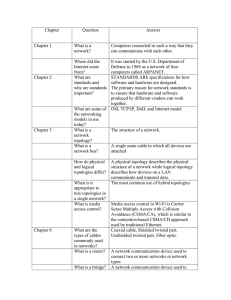
![MA342A (Harmonic Analysis 1) Tutorial sheet 2 [October 22, 2015] Name: Solutions](http://s2.studylib.net/store/data/010415895_1-3c73ea7fb0d03577c3fa0d7592390be4-300x300.png)
